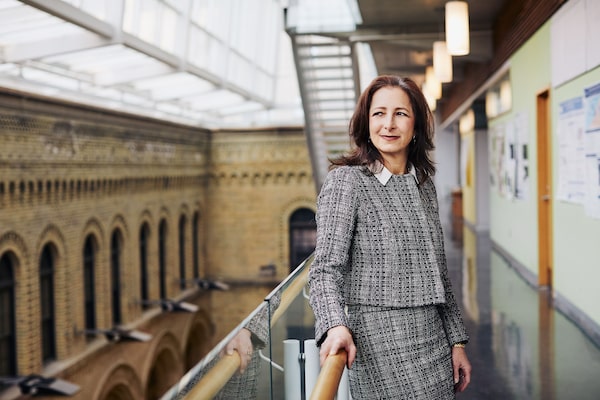
Molly Shoichet at the University of Toronto's Donnelly Centre for Cellular and Biomedical Research is this year's winner of the Gerhard Herzberg gold medal, Canada's top science prize.Sylvie Li/Sylvie Li/NSERC/CRSNG
A University of Toronto researcher who served as Ontario’s first and only chief scientist until Premier Doug Ford scrapped the position has been awarded Canada’s top science prize.
Molly Shoichet, an expert in polymer chemistry whose work is aimed at engineering new tissues and methods of drug delivery, was named the latest winner of the Gerhard Herzberg gold medal for science and engineering on Tuesday. The award, which is bestowed annually by the Natural Sciences and Engineering Research Council, recognizes Canadian scientists who have achieved sustained excellence and influence through their work.
In Dr. Shoichet’s case, that means routinely crossing the academic boundaries that separate the study of materials from the study of medicine and health. She leads a team known for its work on a class of polymer-based materials known as hydrogels, which can promote the growth of cells in three dimensions and have applications in restoring damaged tissues, including after strokes and spinal-cord injuries.
“Our research is clearly interdisciplinary – it’s not just in one field – and so to have that recognized by my peers is great," Dr. Shoichet told The Globe and Mail.
The award comes with a top-up of Dr. Shoichet’s federal research grant to $1-million over five years, and the flexibility to apply the additional funds to new directions and initiatives.
“It gives you the opportunity to think differently about research,” she said.
Dr. Shoichet grew up in Toronto, but did her academic training in the United States, earning an undergraduate degree in chemistry at the Massachusetts Institute of Technology and a PhD in polymer science and engineering at the University of Massachusetts at Amherst. She worked in the biotech industry in the United States, but returned to Canada and took up a professorship at the University of Toronto in 1995. She said the decision was motivated by family considerations and the opportunity to explore what was then a new field, now known as regenerative medicine.
“I was lucky to be at the right place at the right time and to recognize that,” Dr. Shoichet said.
A member of the Order of Canada, Dr. Shoichet is also the only person to have been named a fellow of all three of Canada’s national academies, representing science, medicine and engineering.
Research council president Alejandro Adem said Dr. Shoichet’s breadth of expertise and ability to harness science to solve challenging problems in biomedical engineering are worthy of recognition on their own merits, as well as an indicator of the pace and growing prominence of interdisciplinary research.
“That’s where a lot of the exciting work lies," he said, adding that Dr. Shoichet’s career "is kind of a prototype for what we’ll be seeing more of.”
In addition to her academic achievements, Dr. Shoichet is known for her involvement in science communication and outreach, and for bridging the research and policy worlds through a range of committee and advisory roles.
It was this policy work that led to her appointment as Ontario’s chief scientist in November, 2017. In that role, she advised the government on science-related matters and provided a link between the research community and policy makers. The office was eliminated after the province’s government changed seven months later.
Dr. Shoichet said she still thinks the position is needed and would benefit Ontario.
But her first love remains research, a career path she endorses with enthusiasm.
“If anybody is excited about inventing the future, then science is a fantastic choice,” she said.
Our Morning Update and Evening Update newsletters are written by Globe editors, giving you a concise summary of the day’s most important headlines. Sign up today.